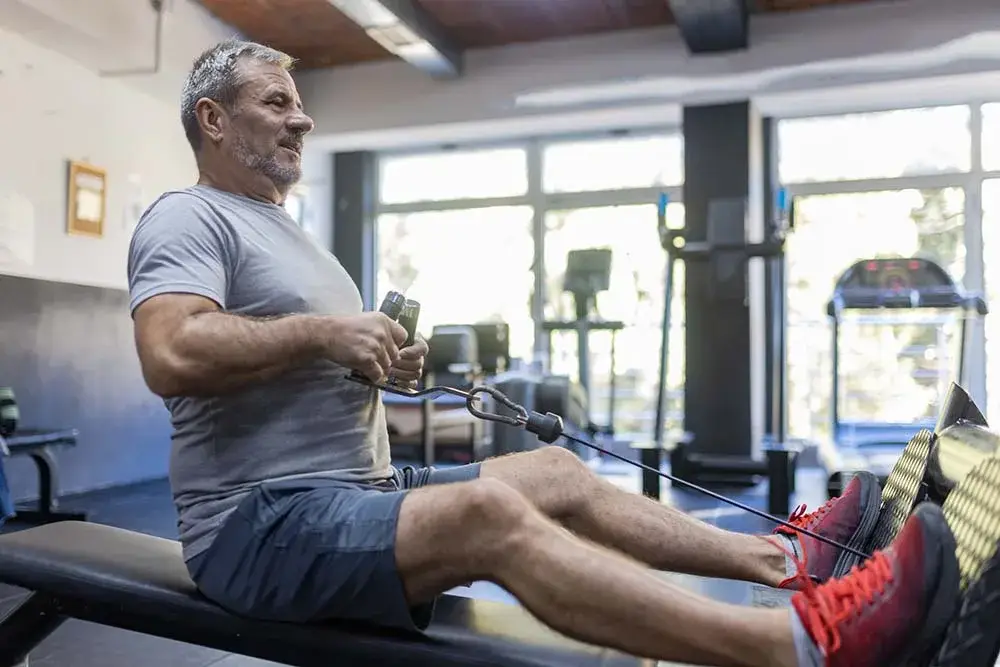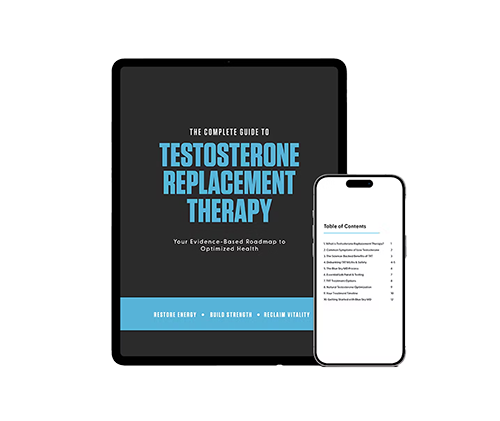Testosterone is a well-known and well-studied hormone that plays a very important role in men’s (and women’s!) health. It affects and influences a wide range of biological functions including growing and maintaining muscle, energy levels, sexual health and libido, and mood.
By now, you’ve likely seen or heard somewhere how men’s testosterone levels naturally decline as they age. As the body produces less and less testosterone, a long list of symptoms start to appear, including a general feeling of fatigue, decrease in strength or muscle mass, fat accumulation, and noticeably lower sex drive or libido.
Recent studies point towards decreasing testosterone levels among men in general— while there is no clear “smoking gun”, this decline may potentially be a result of environmental factors, sedentary lifestyles, modern diets, or some combination of these things. Ultimately, the jury is still out, so to speak.
Fortunately, however, there is a way to treat low testosterone levels, whatever the cause may be. Testosterone replacement therapy is a safe and effective way to treat low testosterone and help men who may be struggling with losing weight, seeing a decrease in muscle mass, or suffering from low energy levels or libido.
The Link Between Testosterone and Weight Gain
One of the main complaints that brings in our male testosterone therapy patients is that they suddenly experience trouble losing weight. Let’s explore the link between low testosterone and weight gain.
Low testosterone levels are associated with weight gain and increased body fat, namely visceral fat. Extra visceral fat can be particularly unhealthy because it surrounds our internal organs. Additional visceral fat is linked to Type 2 Diabetes and heart disease in particular.
One of testosterone’s roles is to help regulate the metabolism, so when testosterone levels drop, the body struggles to burn fat.
Loss of muscle mass is another reason why patients with low testosterone have a hard time losing weight. Simply put, muscle burns fat so having more muscle mass increases our resting metabolic rate, which helps us keep extra weight off.
How Testosterone Therapy Can Improve Weight Loss
Hormones and weight loss are inextricably linked and there are many qualitative benefits to testosterone therapy for men. Let’s dive into the nitty-gritty of the relationship between testosterone therapy and weight loss. Here are a few main points:
1. Muscle Mass & Metabolism
Testosterone therapy can improve muscle mass. As we discsussed above, muscle is a metabolically demanding tissue, meaning the more muscle mass a man has, the more calories they burn, even while resting. Through testosterone replacement therapy, men can grow and preserve muscle and increase their metabolism, which ultimately helps keep unwanted fat off.
2. Testosterone & Fat Storage
Another remarkable feature of increasing testosterone through testosterone therapy is how it affects fat storage. Testosterone actually helps break down fat cells by activating enzymes and preventing fat cell precursors, called preadipocytes, from forming. It also improves insulin sensitivity. Insulin is an important hormone that improves the ability to regulate blood sugar and prevents the storage of excess fat.
3. More Efficiency Burning Fat
Another great benefit of testsoterone replacement therapy and weight loss is that testosterone can increase the body’s efficiency when it comes to burning fat during exercise. One study revealed that men who received testosterone replacement therapy showed increased fat oxidation during physical activity, which means their bodies were more effective at burning fat for energy.
4. Better Sleep, Mood, and Cognition
Testosterone also impacts sleep quality and vice versa. Testosterone fluctuates throughout the day and is linked closely to the circadian rhythm. During sleep, our body body performs many critical functions, like repairing tissues, strengthening the immune system, consolidating memory, and balancing hormone levels.
Someone with low testosterone may have an out-of-whack circadian rhythm and may suffer from poor quality of sleep, which means the body has less time to replenish natural levels of testosterone. Inversely, men with higher testosterone levels tend to spend more time in deep sleep phases, leading to better overall sleep quality.
Someone who’s not getting enough sleep will have trouble focusing during the day, feel fatigued and irritable, and have trouble with memory. They’ll also have trouble staying motivated to workout or engaging in activities.
And, lastly poor sleep affects our hunger levels and makes us seek out fatty, sugary foods that will no doubt lead us to feel even more lethargic and cause us to pack on the pounds.
Testosterone therapy can restore balance to the hormones and help prevent this sleep-related feedback loop that contributes to weight gain.
5. Testosterone Therapy Can Provide More Energy and More Motivation
Fatigue and lack of energy are common symptoms of low testosterone (and also tied to sleep, mood, cognition, etc). This often leads to a sedentary lifestyle, which contributes to weight gain.
When testosterone levels are properly balanced, our patients feel more motivated to exercise and stay active which is a key factor in weight loss. Regular physical activity, in combination with increased muscle mass, creates a powerful positive feedback loop that promotes long-term weight loss.
Find out if testosterone therapy can help with your weight loss goals.
After exploring the link between testosterone, weight gain, fat storage, sleep, metabolism, and everything mentioned earlier in this article, it’s easy to see how our hormones are delicately interconnected with our overall health and well-being.
For men with low testosterone, testosterone replacement therapy can provide more than just an increase in energy and libido. By boosting muscle mass, enhancing fat metabolism, and improving overall well-being, TRT can play a significant role in weight loss.
However, there’s a common saying in the fitness industry that rings true for testosterone therapy as well: ” You can’t out-train a poor diet”.
Testosterone therapy, too, should be a part of a comprehensive lifestyle strategy including proper nutrition, regular physical activity, and medical supervision to ensure safety and efficacy. For some of our patients, a combination of hormone replacement therapy and our medical weight loss program is the right move as we can carefully monitor and adjust hormones as we guide patients through a nutrition and exercise program, all under the supervision of an expert medical team.
The first step in our testosterone therapy program is a test to find out if you have low testosterone. Read more about when to test for low T here. Contact us today to learn more about our program or take our free online health assessment to find the right program for your needs.
Yes, TRT can help obese men lose weight through a number of different ways: it can improve sleep, which improves mood and energy levels, as well as improves motivation to exercise. It can also help regulate resting metabolism and increase muscle mass, which burns fat.
TRT and balancing testosterone levels can help to regulate ghrelin and leptin, two hormones that play a role in controlling appetite.
TRT can increase your resting metabolic rate and increase muscle mass, which also burns additional fat.

Dr. David LaMond, MD
Founder, Medical Director, Blue Sky MD
Dr. LaMond is a nutrition and prevention expert; who is a successful medical entrepreneur. Dave developed and operates numerous successful medical practices, along with a consulting company which helps physicians and medical practitioners operate successful independent practices. Drawing from his foundation and board certification in Family Medicine, he developed the innovative medical principles behind the Blue Sky MD concept of total patient care. Blue Sky MD has appeared on the INC 5000 list three times; as one of the 5000 fastest growing privately held companies in the US.
Dave has been a featured speaker for numerous medical conferences and has been a business and health consultant and has made several appearances on health television broadcasts. His written work has been featured in medical journals and other print media; with a focus on sports medicine, nutrition, wellness and non-invasive cosmetic procedures.
Additionally, Dr. LaMond has been a luminary, speaker and consultant for Crescent Health Solutions, Eleme Medical, Osyris, Suneva Medical and Candela Corporations, served as a clinical professor for Wake Forest University and is an expert in non-invasive and minimally invasive body contouring and cosmetic laser surgery.
Dr LaMond is passionate about the outdoors and has a love for mountain biking. He works as a nutritional coach and physician for professional cyclists, and enjoys training and riding along-side them. Dave has competed in high level mountain bike events regionally and nationally in masters level competition and has been on the podium at USA cycling National Championships.




